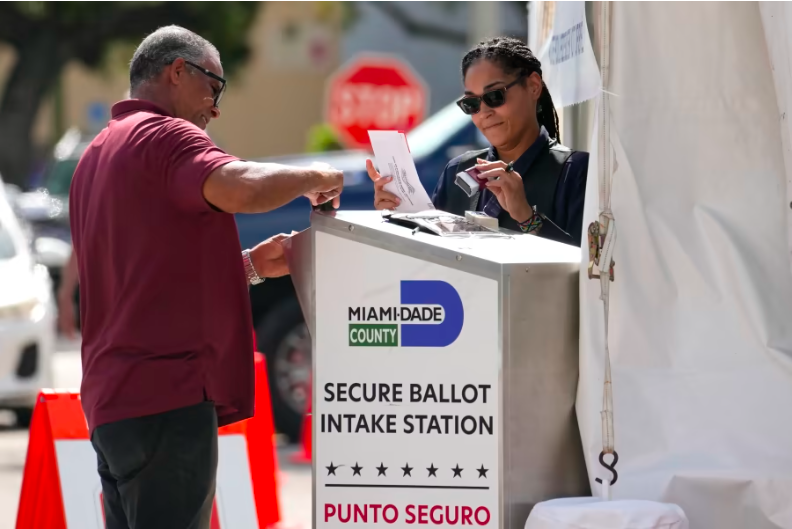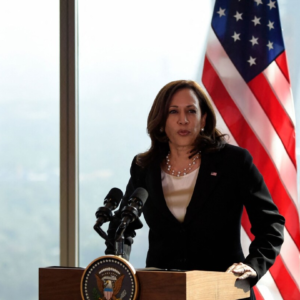
Picture: Staff course of vote-by-mail ballots for the midterm election on the Miami-Dade County Elections Division, Tuesday, Nov. 8, 2022, in Miami. Supply: Lynne Sladky / AP Picture
The 2022 U.S. midterm election outcomes cement a development that impacts U.S.-Latin American coverage—hardline positions are largely bipartisan in Florida. These positions congeal Chilly Battle-era views and complicate coverage change. They’re shared by sufficient Democrats that President Joe Biden, whose angle towards Latin America is mostly centrist (and previously was even typically hawkish), will definitely really feel tempted to not alienate his personal occasion with robust views on Latin America.
For years, conventional wisdom held that demographic modifications in Florida would seemingly shift U.S. coverage towards Cuba away from the established order. Youthful Floridians, even Cuban Individuals, held extra pragmatic views and had been open to altering long-standing insurance policies—most notably the embargo. Nevertheless, these views don’t appear to carry. Youthful Cuban arrivals are inclined to have extra liberal views on social wants, but those change over time as they’re built-in into Republican-leaning communities. This view peaked in 2014, when President Barack Obama introduced the thawing of diplomatic relations with Cuba. Two years later, Donald Trump was elected president and received Florida once more in 2020 regardless of shedding the election.
Additional, Cuban coverage shouldn’t be the one recreation on the town. Since that 2014 peak, governments in each Nicaragua and Venezuela have slid further down the outlet towards authoritarianism. Moreover, Colombia elected not solely a leftist chief of their final election, however a former guerilla. At this level, all of those international locations get consideration in Florida politics. In the course of the 2022 mid-term elections, even Democratic candidates sound like Richard Nixon at his anti-Communist finest. These bipartisan traits may have direct impacts on U.S. overseas coverage—significantly towards Cuba, Venezuela, and Colombia.
Holding Quick to the Cuba Embargo
Florida International University’s poll of Cuban America in 2008 discovered that solely 45 % favored persevering with the embargo, whereas 55 % opposed its continuation. Nevertheless, the same poll in 2022 revealed a unique image—57 % of Cuban-Individuals now assist the continuation of the embargo, a quantity which rises to 63 % when you take away “don’t know” as an choice from the ballot.
Virtually any shift in U.S. sanctions on Cuba instantly generates bipartisan criticism and leads Democratic candidates to complain that the Biden administration is tone deaf in terms of Florida politics. Dealing with the standard calls of being socialist, Democrat Annette Taddeo, who misplaced handily to incumbent María Elvira Salazar for a Home seat, felt compelled to reward the Helms-Burton Act. Though Biden eased some sanctions on Cuba, he has gone no additional. Moreover, not like Obama, he doesn’t criticize the embargo and has been cautious about pushing coverage change towards the island.
Sluggish Change on Venezuela Coverage
As with Cuba, there may be broad bipartisan settlement in Florida that sanctions in opposition to the Venezuelan authorities are applicable. When the administration floated the thought of easing sanctions on Venezuelan oil imports, there was a bipartisan wave of condemnation. Democrat Home Member Darren Soto, for instance, opposed any change in U.S. coverage that was not endorsed by Venezuelan opposition chief Juan Guaidó. To ensure that the Biden administration to shift U.S. coverage towards Venezuela, it must settle for opposition from each Democrats and Republicans.
Though there may be additionally widespread assist in Florida for Short-term Protected Standing for Venezuelans, there is no such thing as a unanimity about easy methods to deal with immigration extra broadly. In truth, 50 percent of Latinos in Florida favored Governor Ron DeSantis’ stunt of flying Venezuelan migrants to Martha’s Winery. Though the Biden administration derided this stunt, it additionally introduced a measure that made it harder for Venezuelans to enter the US, utilizing a coverage (known as Title 42) to expel them to Mexico. For Biden, Venezuela is a decidedly home challenge which results in a larger emphasis on border safety.
Disagreement on Colombia
With Colombia, the Biden administration extra clearly differentiates itself from Florida politics. Taddeo (a Colombian American) denounced the administration’s determination to take away the terrorist designation from the Fuerzas Armadas Revolucionarias Colombianas (FARC) which laid down its arms in 2017. Democratic Miami-Dade Mayor Daniella Levina Cava was also vocally opposed to this determination, saying the U.S. ought to “ought to double right down to reject the extremist communist agenda.” Nevertheless, this very agenda has been rejected by the FARC itself for years. Whereas Florida Democratic figures criticized the Biden administration’s selections on Colombia, that was not sufficient for Republican Congresswoman María Elvira Salazar, who referred to Colombian President Gustavo Petro as a “thief, socialist, Marxist, terrorist.” Taddeo herself said she was “very fearful” about Petro turning into president.
Right here, at the least, President Biden made clear that he appeared ahead to working with President Petro on the 2016 Peace Accord and different points. Secretary of State Tony Blinken additionally recently met with Petro in Bogotá. On the identical time, Petro has solely been in workplace 4 months, so the connection stays untested.
Trying Ahead
Governor DeSantis simply received re-election, and for the primary time in 20 years, a Republican gubernatorial candidate received Miami-Dade County. Within the 2024 presidential election, we must always count on little disagreement in Florida on hardline positions and an uphill battle for any Democratic presidential candidate, significantly if they’re vocal on shifting U.S.-Latin American overseas coverage. President Biden received the 2020 presidential election whereas shedding Florida, so the conservative bent inside his personal occasion in Florida doesn’t need to sway him. Nonetheless, Biden tends to lean in that course. Shifting ahead, a key query is whether or not Biden is prepared to threat alienating parts of his personal occasion to make modifications in his overseas coverage towards Latin America. That calculation is additional sophisticated by the truth that Latino voters nationally are backing Republicans in larger numbers.
Dr. Greg Weeks is a professor of Political Science and Affiliate Dean for Educational Affairs on the College of North Carolina at Charlotte. He’s the writer of quite a few books and articles, together with The Army and Politics in Postauthoritarian Chile (2003), Irresistible Forces: Latin American Migration to the US and its Results on the South (2010), The Bachelet Authorities: Battle and Consensus in Submit-Pinochet Chile (2010), Understanding Latin American Politics (2014) and U.S. and Latin American Relations, 2nd Version (2015). Observe Greg on Twitter at @GregWeeksCLT.
As 2015 unfolded, one-by-one Russia’s principal political supporters in Latin America and the Caribbean entered…
US President Barack Obama’s go to to Cuba and Argentina this week underlines the US…
President Donald Trump’s relationship with Latin America will certainly be one to observe this yr.
Filed Underneath: Democracy & Elections, North America, U.S.-Latin America Relations Tagged With: Florida, foreign policy, Latin America, midterms
Política, economía e concepts sobre
el mundo en español.
©2022 International Individuals
Web site growth by Robert Gourley.




